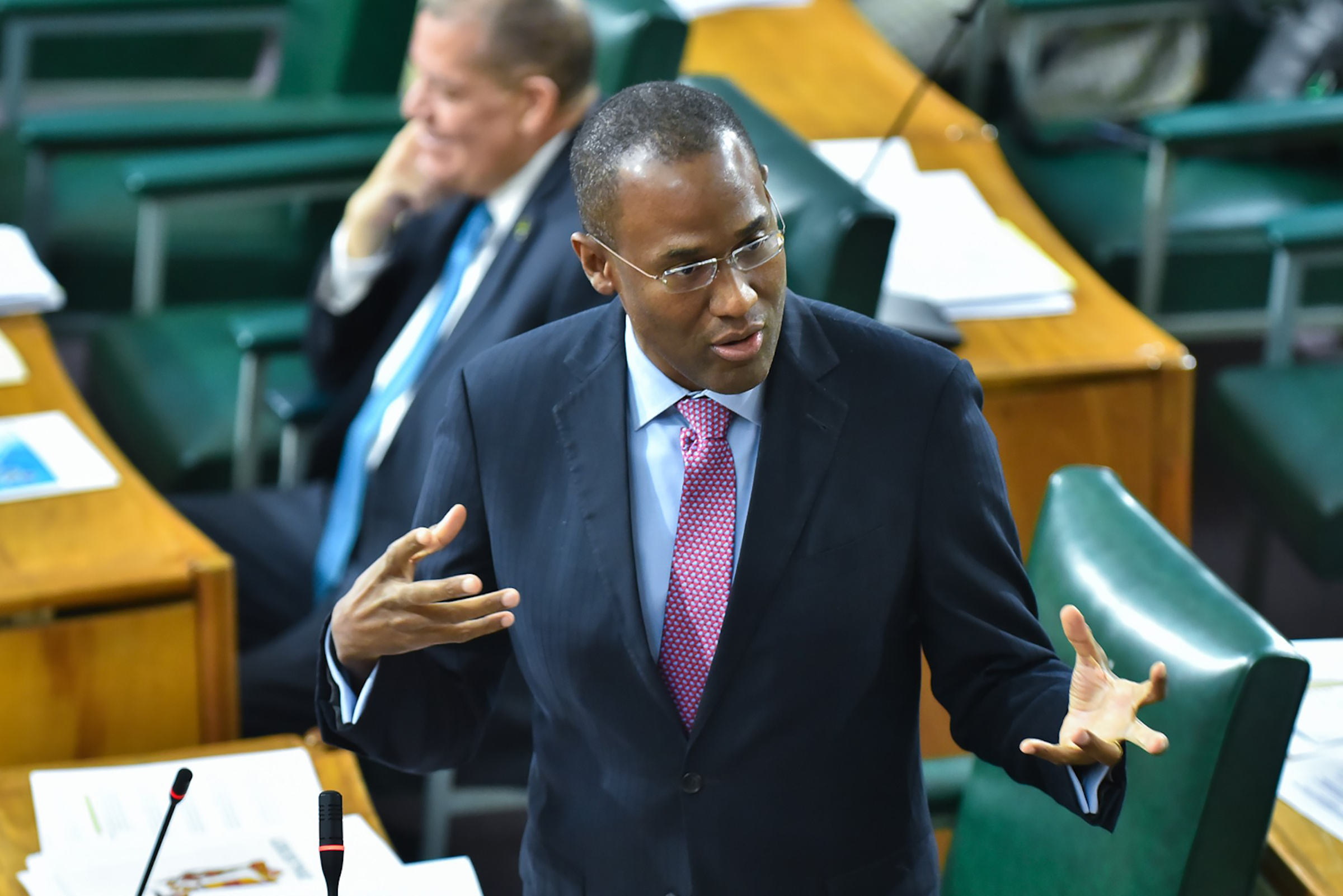
Statement by Finance and the Public Service Minister Nigel Clarke to the House of Representatives on Tuesday, March 28, 2023.
I rise under Section 18 of the Standing Orders of this Honourable House to make a personal explanation and I seek your approval and that of the House to proceed.
In my closing budget presentation last week, I referred to an earlier publicly recorded comment made by the Leader of the Opposition, Mark Golding, in which he described members of the Jamaica Labour Party as “damn fools”.
Taken aback by yet another disparaging and insulting comment from him, I responded in my presentation that this characterisation of members of the Jamaica Labour Party as damn fools “did not sound like Markie G. It sounded like massa Mark”.
Mr Golding has reportedly apologised for those remarks which I appreciate.
Objections have been raised to my use of the word “massa”, which have largely relied upon a misleading imputation of motive and intent.
My remark was meant to draw attention — in a light-hearted way — to a trend by the opposition leader to explicitly denigrate others with his choice of words, without him realising the need to account for those words. It is that unaccountable display of power that I described as “massa”.
The PNP and its affiliates have been quick to characterise my reference as “racist”. The Gleaner has also accused me as using the “race card”. Others have been similarly critical. These characterisations of my comments are unfortunate and untrue.
I would never countenance, and indeed, I reject, race-based politics. That is simply not who I am. Seeking to disqualify someone for political office on the basis of factors such as race, gender, and religion is, and will always be, abhorrent to me.
However, criticising someone for how he describes his fellow Jamaicans in a derogatory manner is not racist.
In any event, the PNP, The Gleaner, and many others have used, or accepted the use of the term “massa” to describe others in a non-racial way, referring instead to a particular leadership attitude and style based on their power.
However, the peace that I have in my position does not simply rest on the bed of moral equivalence. It relies on the rock of Jamaican evidence that confirms that the term, “massa”, is (i) part of the lexicon of modern Jamaica, (ii) habitually employed in non-racial ways, and (iii) always refers to attitudes regarding power relations.
Today, “massa” describes a perceived attitude of those with power in relation to others, not a colour. It describes a perceived disposition, not a race. And it is an acceptable term of the Jamaican language that frequently appears, non-racially, in the written and spoken word.
Does the term have a root in slavery? Absolutely. But, in all cultures, previously subjugated groups often reclaim and reappropriate words that originated during oppressive times for their own use.
In fact, according to the Jamaica Patwah dictionary, the primary definition of “Big Massa” is God Almighty, which is an unquestionable reference to God’s power, not race or colour.
Similarly, the lyrics of a popular, modern, Jamaican gospel song includes the line: “Massa God ah God”. Are Jamaican Christians being racist by their use of the word “Massa” in this song?
When former US Secretary of State Mike Pompeo visited Jamaica in 2018 to meet with seven Caricom Heads of Government, the late Hon Barbara Gloudon wrote an article in the Jamaica Observer titled “Big Massa passin’ thru’”.
Was the esteemed Barbara Gloudon being racist? Was she describing Pompeo as a slave master? No. Mrs Gloudon was referring to her perceptions of the power relations among the parties.
Is the term “massa” only used to describe power relations involving a White person? Well, let’s look at the evidence.
No one accused the Jamaica Police Federation of being racist in 2009 when its then general secretary likened then Prime Minister Bruce Golding to a “backra massa” during the course of wage negotiations. The story appeared in The Gleaner but there were certainly no editorials about use of a racial slur.
Former PNP MP, Rev Ronnie Thwaites, has used the terms “backra” and “backra massa” on a number of occasions in his columns. In a 2018 column that was titled, and that ended with, “Yes Backra!”, Rev Thwaites outlined his reasons for voting against the then state of emergency, and implied that, in his view, the Holness Administration was exhibiting “backra” tendencies .
He was referring to his perception of an attitude and approach of members of the Government in power, not their race.
Are these terms only used in reference to politicians? No. But it always refers to an attitude and leadership style related to power.
In 2019, a Gleaner headline read “Cumberland principal, staff at loggerheads over ‘backra massa’ leadership”. The entire criticism in the article was based on an accusation of disrespect through the principal’s perceived choice of language and leadership attitude. The article had nothing whatsoever to do with race.
Twice in the past, Gleaner guest columnist Kevin O’Brien Chang has described, in his view, a previous West Indies Cricket Board as having a “Backra Massa” leadership attitude. Nothing about race or colour.
Despite the hullabaloo created by the PNP — which, in my view, was an attempt to distract from Mr Golding’s ill-tempered and unfortunate remark — they themselves have employed the very same vocabulary to describe others.
In 2017, the PNP’s Peter Bunting and current PNP General Secretary Dr Dayton Campbell appeared in an episode of Bunting’s online programme, Probe, titled “Mombasa Grass for Massa Horse”. The “Massa” referenced here was then Minister of Agriculture, the Hon Karl Samuda.
The byline to this “Massa”-titled Probe episode was “probing…issues of power”. For Bunting and Campbell back then, “massa” wasn’t about race, it was about power. And the link to this “Massa”-titled programme was retweeted from the official PNP Twitter account with the encouragement, “watch this video…”.
It is therefore such profound and naked hypocrisy by the PNP to now claim “racism” when the exact same term they used is now applied to Peter Bunting’s business and political colleague Mark Golding.
Some will argue that the PNP is experiencing a kind of identity crisis. Normally the fundamental point I am making — about the inappropriateness of referring to Jamaicans, including Black Jamaicans, with derogatory terms such as “likkle boy”, “likkle lady”, and “damn fool” — is a point the PNP of an earlier vintage would themselves have made emphatically.
It’s an irony of ironies that calling out this disrespect by the Opposition leader is met with cries of victimisation from the PNP.
There are several Jamaican proverbs that make use of the word “massa”. Here are a few:
• “Sleep hab no massa” — Eventually, sleep will overpower you.
• “Maasa haas, maasa grass” — About power, control and entitlement.
• “Patient dawg nyam ’im massa bone” — With patience, you can rise above those who may have authority over you.
Are we racist, or racially motivated when we invoke these Jamaican proverbs? No. In these proverbs “massa” is used non-racially in relation to power and authority.
Despite political competition, Mark Golding and I have always enjoyed a very productive relationship in this, and the other House, and a warm and friendly one outside, inclusive of our wives. Some of the interpretations I have seen, and listened to, are inconsistent with that reality.
The reasons are, speaking my truth, that my remarks have been misconstrued, my motives have been misrepresented, and my intentions have been distorted.
I regret that some persons may have viewed my remarks as racially motivated. To again be clear, this was never my intention. To apologise, however, would be to legitimise what simply is not true.
The truth is that “massa”, in its modern usage, is applied non-racially. “Massa Mark” was not about race; “Massa Mark” was not about colour; Massa is always about an attitude and style regarding power, and that is how I used the term to describe what I saw as the disrespectful attitude and language of the Opposition leader.



